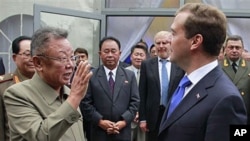The United States has called reported North Korean nuclear concessions welcome but insufficient. North Korean leader Kim Jong Il told Russian officials that Pyongyang would freeze tests and production of nuclear weapons and missiles in the context of renewed six-party negotiations.
Officials in Washington are not rejecting Kim’s gesture out of hand. But they say the concessions the North Korean leader offered in a meeting with Russian President Dmitri Medvedev are not enough to resume six-party talks on ending the North’s nuclear programs.
A Russian spokesman reported that Kim Jong Il said Pyongyang is ready to return to negotiations. Kim also said that in the course of talks, North Korea would be ready to “resolve the question” of a moratorium on tests and production of “nuclear missile weapons.”
The United States has said in the past that such a moratorium is a condition for restarting the stalled nuclear talks.
Short of necessary prerequisites
State Department spokeswoman Victoria Nuland said Wednesday if, in fact, Pyongyang is willing to refrain from nuclear tests and missile launches, it would be welcome.
But she said as is, the offer would be insufficient, noting it doesn’t mention Pyongyang’s uranium enrichment program.
“As you know, their disclosure last November of a uranium enrichment facility remains a matter of serious concern to us. And these activities are a clear violation of their obligations under U.N. Security Council resolutions 1718 and 1874 and contrary to the commitments they made in 2005. So if it’s true, [it’s a] welcome first step, but far from enough.”
North Korea agreed in principle to scrap its nuclear program, including a presumed small arsenal of nuclear weapons, in 2005 in return for economic and diplomatic benefit.
However, the six-party talks, involving the two Koreas, Japan, Russia, the United States and host China dragged on inconclusively and broke down in 2008.
Past failures
Pyongyang tested a nuclear device in 2006, and another in 2009 after the talks foundered, and has conducted several missile tests.
North-South Korea relations were in crisis last year after Pyongyang sank a South Korean warship and shelled a southern coastal island.
Tensions have eased of late, though, with North and South Korean officials meeting last month at an ASEAN conference in Bali, Indonesia. U.S. and North Korean envoys later met in New York.
Some policy analysts are skeptical about North Korea’s recent conciliatory moves, which they link to its deepening economic problems.
Bruce Klingner, the senior research fellow for Northeast Asia at Washington’s Heritage Foundation, said the vague pledges made by the North Korean leader are part of what he terms a “charm offensive.” He said there may be less substance to the gesture than is indicated by news headlines.
“If you look at the actual wording from the Russian spokesperson, they merely stated that in the course of the talks, North Korea would be ready to resolve the question of imposing a moratorium on tests and production of nuclear missile programs," said Klingner. "So it’s far short of a pledge for unilateral action prior to resuming the nuclear negotiations. And also the wording of it clearly gives Pyongyang plenty of opportunity to try to seek out concessions during the talks themselves.”
Empty promises
Klingner said nothing came of a reported North Korean offer last December to re-admit international inspectors to its Yongbyong nuclear complex.
South Korea’s Yonhap news agency quoted a senior official in Seoul as saying the Russia-North Korea summit fell short of expectations, and that Pyongyang needs to address the uranium enrichment issue.
Nuland said she expects U.S.-Russian consultations on the summit once the North Korean leader has returned home. She rejected a suggestion the meeting reflects an emerging alliance between Moscow and Pyongyang. She said Russia’s aim in the six-party talks is the same as that of the United States, and that they will not resume until North Korea meets its previous commitments.
US: North Korean Nuclear Concessions Welcome, But Insufficient




